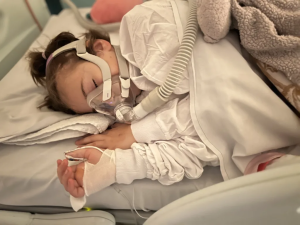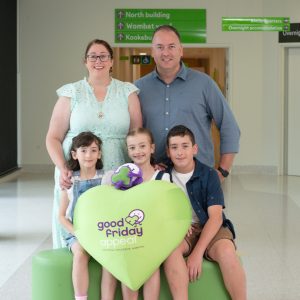Ten-year-old Emily is one of the little Ambassadors for the 2024 Good Friday Appeal. She is the bubbly heart and soul of her family of five, and loves playing cricket and soccer, is quick to make a joke and adores spending time with her friends.
Emily was three-and-a-half-years-old when her parents Allison and Liam noticed something wasn’t quite right. Their toddler would often catch herself on the sides of doorways, water would come out of her nose, and her speech was not developing as they expected. Emily was referred to an ear, nose and throat (ENT) specialist, and her parents continued to monitor her closely.
Twelve months later, Emily was still having trouble swallowing. She was experiencing tremors and having difficulty walking in a straight line. This time, Allison and Liam were referred to a neurologist and Emily had her first MRI.
“I remember the phone call coming in, and I looked at my phone, thinking that was odd. I remember the neurologist saying we found something and needed to bring her back and check how fast it was growing. I remember trying very hard not to cry on the phone,” Allison said.
The neurologist said they had found a lesion in Emily’s brainstem that was presumed to be a slow growing glioma, a type of brain tumour. Emily was placed on a watch and wait protocol before starting chemotherapy.
“We walked out of that appointment feeling shell shocked and cried about what would happen. It was the first time that we grieved about what the future might look like. It is a type of grief that doesn’t leave you that your child’s future isn’t going to be what you thought,” said Allison.
The family returned to Victoria to be closer to family, and Emily’s paediatrician put them in touch with neurosurgeons at The Royal Children’s Hospital (RCH). They connected Emily, Allison and Liam with other specialists across the hospital including oncologists, ENT, respiratory doctors, gastroenterologists and dieticians.
 The location of Emily’s tumour is in her brain stem, the most difficult part of the brain to operate on, and most dangerous as it controls almost everything that her body does. She has undergone two craniotomies to try get enough of the tumour to provide more targeted treatment, as chemotherapy was gruelling on her small body.
The location of Emily’s tumour is in her brain stem, the most difficult part of the brain to operate on, and most dangerous as it controls almost everything that her body does. She has undergone two craniotomies to try get enough of the tumour to provide more targeted treatment, as chemotherapy was gruelling on her small body.
The craniotomies involved opening a window into her skull by removing a piece of bone, taking a sample of her tumour, then putting the piece of bone back into place. Despite the risks of these procedures, Emily took everything in her stride.
“Usually if you have a problem, you make a plan to fix it but this is brain cancer and it’s likely going to be there for the rest of her life. We just have to try find some semblance of normality for her,” Liam said.
Although she has spent much of her young life at the RCH, Emily does not let her condition interfere with living her best life. The team at the hospital have watched Emily grow from a tiny six-year-old, into the amazing 10-year-old she is now.
“They are some of her biggest supporters and walk alongside us to advocate and assist Emily living the best life she can,” Allison said.
“Her care team at the RCH have always treated Emily with the greatest care and ensured that Emily has agency and a voice in the process. They are all invested in making sure Emily has the best quality of life while finding a treatment that will give her the best possible outcome.”

Emily and her family.
Emily is now on her third treatment protocol, a new drug aiming to starve her tumour of the protein it needs to grow, which has so far been much kinder on her body than her two previous therapies.
“This experience has left a lasting impact on our whole family. It has not been easy, but it has taught us how to step back and be present in the moment,” Allison said.
“It has brought into our lives some amazing people who we will always be eternally grateful for.
“While I would love to say that we always cope amazingly well with this experience, the reality is some of the days are really tough.
“Emily’s siblings have had to adapt to the fluidity of their sister’s condition and have become very empathic and compassionate young people themselves.
“Emily has learnt to have a voice for herself and for others.”